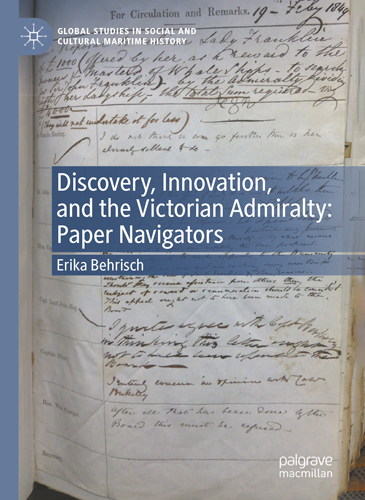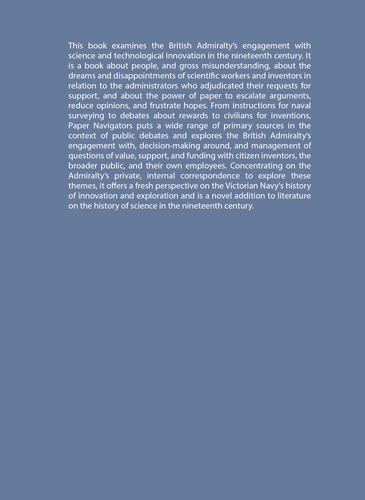Сб с 10 до 16
Discovery, Innovation, and the Victorian Admiralty/Открытия, инновации и викторианское Адмиралтейство
Книга на английском языке
This book examines the British Admiralty’s engagement with science and technological innovation in the nineteenth century. It is a book about people, and gross misunderstanding, about the dreams and disappointments of scientific workers and inventors in relation to the administrators who adjudicated their requests for support, and about the power of paper to escalate arguments, reduce opinions, and frustrate hopes. From instructions for naval surveying to debates about rewards to civilians for inventions, Paper Navigators puts a wide range of primary sources in the context of public debates and explores the British Admiralty’s engagement with, decision-making around, and management of questions of value, support, and funding with citizen inventors, the broader public, and their own employees. Concentrating on the Admiralty’s private, internal correspondence to explore these themes, it offers a fresh perspective on the Victorian Navy's history of innovation and exploration and is a novel addition to literature on the history of science in the nineteenth century.
Contents
1. Introduction: Triangulating the New-Discovery, Innovation, Bureaucracy
1. “The Usual Practice”: Decision-Making in the Archives
2. “A Monotonous and Arduous Service”: Science, Surveying, and Servitude Aboard
1. “Disinterested as Well as Useful”: Surveying as Science
2. A “Labour of Love”: Surveying in the Official Record
3. “From Morning to Evening We Toil”: Field Notes on Naval Surveying
4. Conclusion: “Peculiar Service”
3. “Considerable Magnetic Disturbance”: The Niger Expedition, Science, and Networks of Influence
1. Orders, Hints, and Wishes: Expanding the Mandate
2. Natural Order: Revising Disaster
3. Orders and Regulations: Trouble on Ascension
4. Conclusion: Bright Hopes, Disappointed106
5. En Route with the British Admiralty’s Manual of Scientific Enquiry (1849)
1. “The Non-aesthetical Brain of a First-Lieutenant”: Science, the Admiralty, and the Press
2. “Men Merely of Good Intelligence”: Marketing the Manual
3. “For Their Lordships to Consider”: How to Adjudicate Public Money
4. Conclusion: Reifying the Distance147
5. Private Inventions, Public Purse: Technological Innovation and the Admiralty Board
1. “The Greatest Possible Utility”: The Admiralty Board Engage
2. George Shepherd: Patriotism or Professionalism
3. Digging In: John Trotman and His Anchor
4. “That Which the Patentee Has Patented”: John Clare and HMS Warrior
5. Joseph Taylor and the Secret of the Patent
6. Conclusion: The Fine Print189
6. Conclusion: Notes in the Margin195
Works Cited
Index




